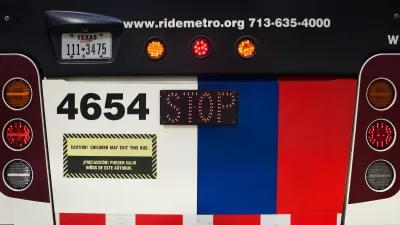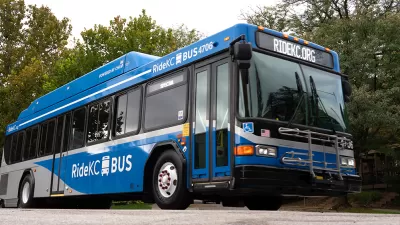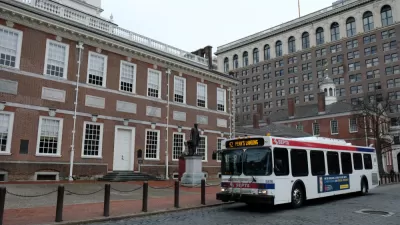Transit advocates worry that outsourcing fixed-route service will decrease service levels and raise costs for riders.

According to a blog post from TransitCenter, "[d]espite mounting evidence of the limits of microtransit, the transit agency in Denton, TX, is barrelling ahead with a plan to replace most of its fixed-route bus system with on-demand service." The "on-demand vans operated by Via are expected to replace six out of DCTA’s eight local bus routes, as well as its express bus service."
"But other experiments in microtransit – Innisfil, Ontario; Pinellas County, Florida; and Los Angeles – serve as cautionary tales. Outsourcing fixed-route transit functions to microtransit companies has not panned out well for riders or workers. Nor does it usually turn out to be the fiscal bargain it was promised to be." Unlike public transit, microtransit costs more as it scales up in size and geographic reach. If Denton goes forward with the plan, "thousands of riders’ daily mobility needs may soon hinge on a dubious business model that has performed poorly in other places. The promises of cheap fares, shorter waits, and lower costs only hold up when few people use the system and transit workers are devalued."
The blog post concludes that "[m]icrotransit is aptly named. Ridership will always remain tiny with microtransit, because the service is, by definition, preposterously expensive to scale up. And microtransit is typically tied to a business model that shrinks wages and benefits for transit workers."
FULL STORY: No Go Zone: Behind the Plan to Shrink the Bus System in Denton, Texas

Alabama: Trump Terminates Settlements for Black Communities Harmed By Raw Sewage
Trump deemed the landmark civil rights agreement “illegal DEI and environmental justice policy.”

Planetizen Federal Action Tracker
A weekly monitor of how Trump’s orders and actions are impacting planners and planning in America.

Why Should We Subsidize Public Transportation?
Many public transit agencies face financial stress due to rising costs, declining fare revenue, and declining subsidies. Transit advocates must provide a strong business case for increasing public transit funding.

Understanding Road Diets
An explainer from Momentum highlights the advantages of reducing vehicle lanes in favor of more bike, transit, and pedestrian infrastructure.

New California Law Regulates Warehouse Pollution
A new law tightens building and emissions regulations for large distribution warehouses to mitigate air pollution and traffic in surrounding communities.

Phoenix Announces Opening Date for Light Rail Extension
The South Central extension will connect South Phoenix to downtown and other major hubs starting on June 7.
Urban Design for Planners 1: Software Tools
This six-course series explores essential urban design concepts using open source software and equips planners with the tools they need to participate fully in the urban design process.
Planning for Universal Design
Learn the tools for implementing Universal Design in planning regulations.
Caltrans
Smith Gee Studio
Institute for Housing and Urban Development Studies (IHS)
City of Grandview
Harvard GSD Executive Education
Toledo-Lucas County Plan Commissions
Salt Lake City
NYU Wagner Graduate School of Public Service





























